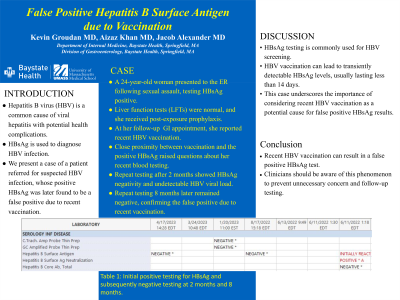Tuesday Poster Session
Category: Liver
P3994 - False Positive Hepatitis B Surface Antigen Due to Vaccination
Tuesday, October 24, 2023
10:30 AM - 4:00 PM PT
Location: Exhibit Hall

Has Audio

Aizaz Khan, MD
University of Massachusetts Chan Medical School-Baystate
Springfield, Massachusetts
Presenting Author(s)
Kevin Groudan, MD, Aizaz Khan, MD, Jacob Alexander, MD
University of Massachusetts Chan Medical School-Baystate, Springfield, MA
Introduction: Hepatitis B virus (HBV) is a common cause of viral hepatitis that can lead to health complications including cirrhosis and hepatocellular carcinoma. A reactive Hepatitis B surface antigen (HBsAg) is indicative of acute or chronic HBV infection. We present a patient referred to gastroenterology (GI) clinic for suspected HBV infection because of a positive HBsAg. On further evaluation, her HBsAg was felt to be a false positive from recent vaccination.
Case Description/Methods: A 24-year-old woman with history of obesity presented to the emergency room (ER) for a sexual assault that occurred a few hours prior to arrival. She was tested for sexually transmitted infections and found to be HBsAg positive. Her liver function tests (LFTs) were normal. She was discharged from the ER on post-exposure prophylaxis with Truvada and scheduled a GI outpatient follow up for suspected HBV infection.
At her GI appointment, she denied a prior history of HBV and was noted to have a negative HBsAg approximately 2 years prior to her visit. She denied any use of injection drugs. She denied a history of jaundice, leg swelling, abdominal distention, confusion, hematemesis or melena. She was noted to have received 3 doses of the HBV vaccine in her neonatal period. On further questioning, she reported receiving a dose of the HBV vaccine 3 days prior to presenting to the ER because she did not have protective HBV antibody titers needed to volunteer in the hospital.
The close proximity between her vaccine dose and her positive HBsAg raised concern for a false positive test due to the vaccine. Furthermore, her normal LFTs argued against acute HBV infection, and her positive HBsAg was noted within mere hours of the sexual assault. HBsAg and a HBV viral load were repeated in 2 months, at least 1 month after she completed Truvada. HBsAg was now negative and her HBV viral load was non-detectable. She completed her Hepatitis B vaccine series required to volunteer, and a HBsAg and HBV viral load were again repeated 8 months later. They remained negative, suggesting her initial HBsAg test was a false positive due to her recent vaccination.
Discussion: HBsAg testing is the most commonly used screening tool to identify HBV infection. HBV vaccination has been shown to cause transiently detectable levels of HBsAg. According to studies, HBsAg positivity due to vaccination is unlikely to persist more than 14 days after vaccination. This case emphasizes recent HBV vaccination as a potential cause for false positive HBsAg testing.
Disclosures:
Kevin Groudan, MD, Aizaz Khan, MD, Jacob Alexander, MD. P3994 - False Positive Hepatitis B Surface Antigen Due to Vaccination, ACG 2023 Annual Scientific Meeting Abstracts. Vancouver, BC, Canada: American College of Gastroenterology.
University of Massachusetts Chan Medical School-Baystate, Springfield, MA
Introduction: Hepatitis B virus (HBV) is a common cause of viral hepatitis that can lead to health complications including cirrhosis and hepatocellular carcinoma. A reactive Hepatitis B surface antigen (HBsAg) is indicative of acute or chronic HBV infection. We present a patient referred to gastroenterology (GI) clinic for suspected HBV infection because of a positive HBsAg. On further evaluation, her HBsAg was felt to be a false positive from recent vaccination.
Case Description/Methods: A 24-year-old woman with history of obesity presented to the emergency room (ER) for a sexual assault that occurred a few hours prior to arrival. She was tested for sexually transmitted infections and found to be HBsAg positive. Her liver function tests (LFTs) were normal. She was discharged from the ER on post-exposure prophylaxis with Truvada and scheduled a GI outpatient follow up for suspected HBV infection.
At her GI appointment, she denied a prior history of HBV and was noted to have a negative HBsAg approximately 2 years prior to her visit. She denied any use of injection drugs. She denied a history of jaundice, leg swelling, abdominal distention, confusion, hematemesis or melena. She was noted to have received 3 doses of the HBV vaccine in her neonatal period. On further questioning, she reported receiving a dose of the HBV vaccine 3 days prior to presenting to the ER because she did not have protective HBV antibody titers needed to volunteer in the hospital.
The close proximity between her vaccine dose and her positive HBsAg raised concern for a false positive test due to the vaccine. Furthermore, her normal LFTs argued against acute HBV infection, and her positive HBsAg was noted within mere hours of the sexual assault. HBsAg and a HBV viral load were repeated in 2 months, at least 1 month after she completed Truvada. HBsAg was now negative and her HBV viral load was non-detectable. She completed her Hepatitis B vaccine series required to volunteer, and a HBsAg and HBV viral load were again repeated 8 months later. They remained negative, suggesting her initial HBsAg test was a false positive due to her recent vaccination.
Discussion: HBsAg testing is the most commonly used screening tool to identify HBV infection. HBV vaccination has been shown to cause transiently detectable levels of HBsAg. According to studies, HBsAg positivity due to vaccination is unlikely to persist more than 14 days after vaccination. This case emphasizes recent HBV vaccination as a potential cause for false positive HBsAg testing.
Disclosures:
Kevin Groudan indicated no relevant financial relationships.
Aizaz Khan indicated no relevant financial relationships.
Jacob Alexander indicated no relevant financial relationships.
Kevin Groudan, MD, Aizaz Khan, MD, Jacob Alexander, MD. P3994 - False Positive Hepatitis B Surface Antigen Due to Vaccination, ACG 2023 Annual Scientific Meeting Abstracts. Vancouver, BC, Canada: American College of Gastroenterology.
